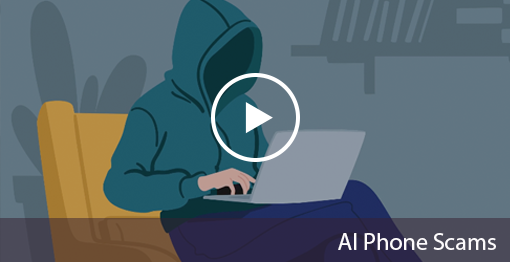October is National Cybersecurity Awareness Month
First recognized by the President of the United States and Congress in 2004, Cybersecurity Awareness Month (CSAM) has been a collaborative effort by the government and various industries to ensure every American has the resources and tools to stay safe and secure while online.
As technology advances, the need for cybersecurity education is greater than ever. Below are key topics to help you safely navigate today's technology-focused landscape and reduce risks when online and connected to devices.
Use strong passwords and a password manager:
A strong password should include all four-character types:
A strong password should include all four-character types:
- A combination of upper and lowercase letters (A-Z, a-z).
- At least one numerical character (0-9).
- At least one special character (~!@#$%^&*()_+=).
- A minimum of eight (8) characters in length.
- Do not set your computer or devices to "Save Password"!
Password managers are apps that generate random passwords for the sites that you visit. Password managers are a powerful tool that can assist you in creating strong and unique passwords. They also make storing passwords and user IDs easy.
Turn on multifactor authentication (MFA):
Also known as two-factor authentication, this tool secures your accounts by requiring two pieces of information to log in. Here are common forms of two-factor authentication:
Also known as two-factor authentication, this tool secures your accounts by requiring two pieces of information to log in. Here are common forms of two-factor authentication:
- Entering your password and then being required to enter a one-time code that is sent to your email address or smartphone.
- Answering security questions.
- Identifier such as your face or fingerprint.
- Temporary password sent to you via an authenticator application.
Enable multifactor authentication on all your online accounts that offer it, especially email, social media, and financial accounts.
Recognize & report phishing:
Phishing emails, texts, and calls are the number one-way data gets compromised. Always be cautious of unsolicited emails texts, and calls asking for personal information.
Phishing emails, texts, and calls are the number one-way data gets compromised. Always be cautious of unsolicited emails texts, and calls asking for personal information.
- Do not respond to unsolicited emails, texts, or calls requesting personal information.
- Do not click on links or open attachments sent from unknown sources or enter personal information in a pop-up screen.
- Monitor accounts for unauthorized access.
Update software:
Always make sure your software is up to date. This is the best way to ensure you have the latest security patches and updates on your devices.
Always make sure your software is up to date. This is the best way to ensure you have the latest security patches and updates on your devices.
- Use firewall protection.
- Use and update anti-virus and anti-malware software.
- Secure wireless networks.
Watch out for AI Phone Scams:
Scammers are constantly looking for ways to trick you, and as technology becomes more sophisticated, so do the scams.
A new threat is AI voice scams, which can impersonate the voices of loves ones or trusted figures.
Scammers use AI voice cloning to create convincing audio messages to deceive individuals into taking urgent action such as sending money. Family scams are particularly effective because they prey on emotions and concern for loved ones.
The key to staying safe from AI voice scams is awareness and knowing how to spot red flags.
IMPORTANT!! Nebraska Energy Federal Credit Union will NEVER send e-mails, texts, or make phone calls asking for your account number, credit and/or debit card numbers, username, password, or other personal information.








